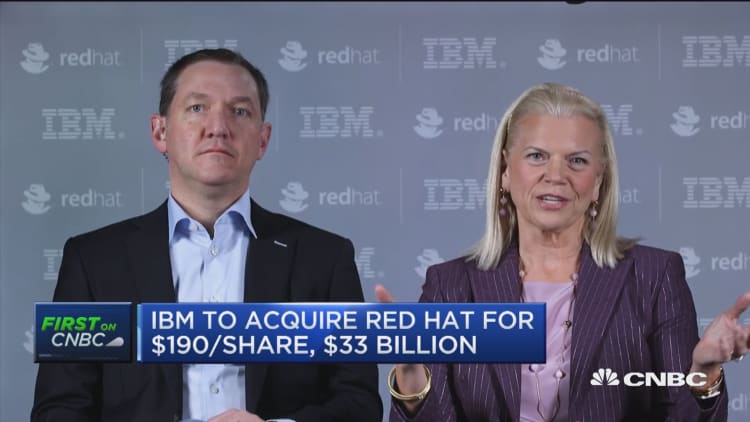
IBM announced Sunday it plans to acquire Red Hat, a major distributor of open-source software, at more than a 60 percent premium. The $34 billion price tag and timing of the deal raised some eyebrows.
IBM has seen several years of near-consistent declines in revenue. And it trails heavyweights such as Amazon, Microsoft and Google for a small share of the cloud market.
Wall Street is largely optimistic on the deal, if slightly surprised. The consensus is IBM needed to take some sort of action to boost performance in a key business segment. But there's still the question of short-term earnings and a possible bidding war. IBM isn't expecting positive earnings impact from the tie-up for at least two years, should the deal go through.
Here's what top Wall Street analysts are saying about the deal:
Nomura's Jeffrey Kvaal: 'As transformative as it gets'
We consider Red Hat's Linux container software OpenShift the key to the deal; it accelerates IBM's ability to help enterprises migrate workload to and between multiple clouds, including AWS, Google, and Microsoft's Azure. The deal is pricey. However, we believe it works both financially and strategically. ... This is as transformative as it gets for IBM.
Wedbush's Dan Ives: 'Game changing'
This is a "game changing" cloud acquisition that will have wide-reaching ramifications not just for IBM, but across the broader cloud and tech space and could spark an acceleration in M&A over the next 6 to 12 months. In our opinion this was a major shot across the bow from IBM and [CEO Ginni] Rometty to core cloud players such as Amazon (AWS), Microsoft (Azure), and Google (Google Cloud) that there is another player in town that plans to aggressively compete in this massive secular hybrid cloud shift. While it will take some time to see the merits of this deal manifest and the impact on enterprise hybrid cloud competitive deployments in the field with the deal not officially closing till 2H19, we believe the combination of Red Hat and its Linux cloud platform with IBM could represent a formidable cloud behemoth for the coming years.
KeyBanc's Arvind Ramnani: Shake up the league tables
IBM's acquisition of Red Hat has the potential to shake up the league tables, in a $1T growing cloud market. ... This acquisition propels IBM to be a leading hybrid provider. With this elevated profile in the cloud landscape, IBM now offers a more compelling alternative to Amazon, Microsoft, and Google. In our view, its ability to increase its relevance to the enterprise will largely depend on the speed of integration and ability to remain flexible/nimble, and that it doesn't dilute the offering by bundling offerings with legacy products.
Moody's Rick Lane: Positive for the long term
Moody's views the acquisition as strategically positive for IBM's long-term cloud strategy. The acquisition of Red Hat would accelerate IBM's ability to help enterprise clients transition to a multi-cloud, hybrid IT environment, given Red Hat's leading position in the Linux operating system and solid position in middleware and related emerging technology markets. At the same time, IBM would need to balance the neutral nature of Red Hat's approach to helping customers transition to a multi-cloud, hybrid cloud environment while achieving revenue synergies by cross-selling its products to Red Hat's existing customers.
Stifel's David Grossman: Buying an installed base
While we do not expect meaningful near-term earnings accretion, there is strong strategic rationale for the purchase, which should be viewed positively. That said, the relative size of the transaction and the incremental leverage will likely raise concerns as may the timing (heightened concerns about IBM fundamentals). ... While there could be multiple strategic benefits, the one that seems most obvious to us is access to RHT's 100,000 enterprise customers. The market is in various stages of migrating to a hybrid cloud environment; however, industry statistics suggest that only 20-30% of the eligible workloads have migrated. We believe the RHT installed base provides meaningful opportunity for IBM to increase its share of wallet in these accounts.
BMO's Keith Bachman: Surprised Red Hat would sell
We are surprised that Red Hat would sell at this time. We think IBM's interest in making a big move is lack of meaningful product portfolio driven by years of cost cuts, even as services has started to turn the corner. From a strategic perspective, we think IBM needs to take bold actions, but we also think the most significant risk is that IBM, in our judgement, has a mixed track record on integrating and managing purchased product companies.
Jeffries' John DiFucci: Calling neutrality into question
In regard to the IBM/Red Hat combination, we question whether this will have a negative effect on Red Hat's business. As an Operating System vendor first, its neutrality to all hardware vendors was an important characteristic in our opinion. The IBM acquisition certainly calls that neutrality into question.
Cowen's Gregg Moskowitz: Don't rule out a bidding war
The substantial premium that IBM is paying for RHT might on the surface seem to make it highly unlikely that a superior bid could occur. However, we believe there is a reasonable possibility that another suitor could emerge. We emphasize that we do not yet know what the break-up fee for the proposed transaction is. But if the break-up fee does not present a massive impediment, we believe there are other companies that could take a hard look at RHT as a strategic target. Most likely would be CSCO (Silverstein) and GOOGL (Blackledge), in our view, although ORCL (Wood) would be a possibility as well.


